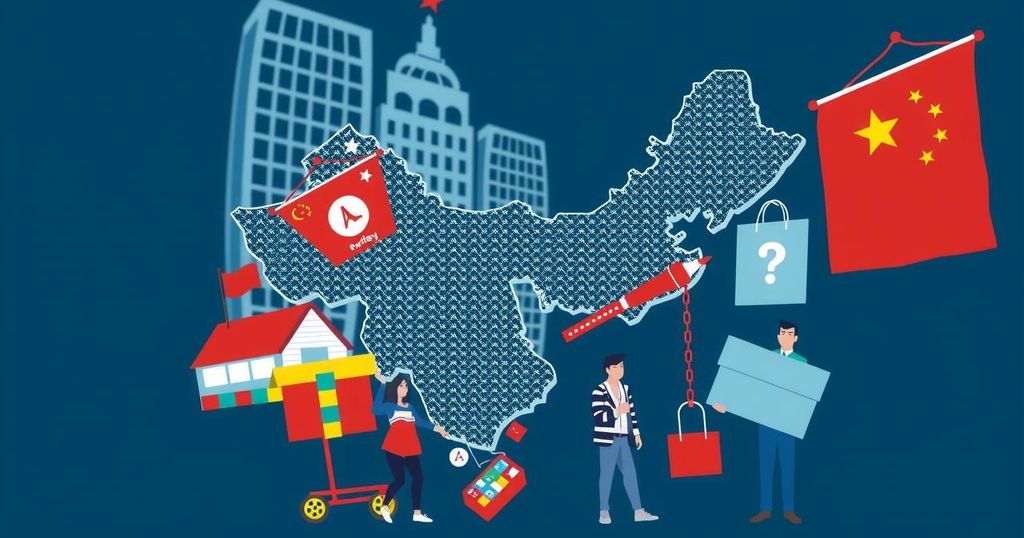As the U.S. presidential election reaches its climax, a significant volume of election merchandise is being imported from China, undercutting local manufacturers. Despite candidates advocating for domestic manufacturing, many campaign items available to consumers are not made in the USA, largely due to e-commerce platforms facilitating this trade. This price challenge poses critical implications for U.S. manufacturing jobs and trade policies, particularly in the context of the de minimis loophole allowing cheaper imports. Figures such as Ben Waxman and Kim Glas underscore the struggles faced by American manufacturers against low-cost imports, complicating the candidates’ messages about supporting the domestic economy.
As the United States presidential election approaches its conclusion, a notable trend has emerged among voters expressing their political support through various election merchandise. However, many individuals may be unaware that items such as the iconic “Make America Great Again” hats and novelty shirts supporting candidates are often manufactured in China. This surge in Chinese-produced election merchandise has been facilitated by accessible e-commerce platforms, enabling Chinese vendors to inundate the U.S. market with low-cost options, thereby creating considerable challenges for American manufacturers who find it increasingly difficult to compete due to price discrepancies. Ben Waxman, co-founder of American Roots, provides insight into this dilemma, stating, “I think the amount of stuff on Amazon and Etsy that’s coming from China and other countries in cargo ships and unloaded on American shores is drastically impacting American manufacturers, like myself, ability to compete and grow our own business. I think it’s dramatic.” Waxman highlights the price disparity, noting that his U.S. made campaign T-shirts retail at approximately $15, while similar items from Chinese retailers like Temu can be found for as little as $3. The visibility of Chinese-made election merchandise is particularly prominent on platforms such as Amazon and eBay, where hundreds of thousands of products are available at considerably lower prices compared to their American-made counterparts. For instance, a “Make America Great Again” hat appears on Temu for under $4, whereas the official Trump campaign store prices it at $40. Similarly, official Kamala Harris campaign items are priced much higher than those available from Chinese suppliers. This situation underscores the broader implications of U.S.-China trade dynamics, particularly the de minimis loophole that allows low-cost goods to enter the country with minimal tariffs. Kim Glas, President of the National Council of Textile Organizations, remarked that the abuse of this loophole has led to significant losses in domestic manufacturing, citing that her organization has lost multiple operations in recent years. Interestingly, while both presidential candidates advocate for policies aimed at revitalizing American manufacturing, their supporters concurrently purchase a significant amount of Chinese-made products. Mitch Cahn, President of Unionwear, pointedly remarked, “If someone is supporting a candidate because of that candidate’s economic policy and their position toward improving our economy…and then they’re supporting a candidate by buying a product that’s made in a country that stands for the opposite of that, they’re actually doing themselves and the candidate and the economy a disservice.” This contradiction presents a complex challenge to both candidates as they seek to reconcile their messages with the reality of consumer choices. Additionally, it was reported that thousands of Donald Trump’s Bibles have been produced in China, raising questions about the commitment to “Made in the USA” that the candidate often espouses. This revelation has the potential to alienate sections of his voter base who prioritize domestic manufacturing. Ultimately, while lower prices for election merchandise may benefit consumers, the broader economic implications highlight a critical dialogue about American manufacturing and the need for policies that foster growth within the domestic market, particularly for high-value products. As a result, understanding the intricacies of this phenomenon reveals the nuanced relationship between consumer behavior, economic policy, and international trade that is particularly relevant as the election season progresses.
The flood of Chinese-made election merchandise in the U.S. market has become a significant issue amidst the presidential election. With rising competition from low-cost imports, American manufacturers are struggling to maintain market share. The interplay between consumer choices, low prices, and the ongoing political rhetoric concerning American manufacturing is particularly critical as voters express their political affiliations through merchandise that often contradicts the very economic values they support. This situation is compounded by the de minimis loophole, which allows a substantial number of goods to avoid tariffs, further complicating the landscape for U.S. manufacturers. Additionally, the paradox of American political candidates who advocate for domestic manufacturing while their campaigns benefit from foreign-produced merchandise adds to the complexity of the issue.
In conclusion, the influx of Chinese-made election merchandise presents considerable challenges to American manufacturers as they struggle to compete with the low prices offered by foreign suppliers. The disconnect between consumer purchasing behavior and the aspirations for domestic manufacturing reflects a broader economic dilemma that American voters and political candidates must navigate. While consumers benefit from lower prices, the implications for American manufacturing jobs and the economy are profound, highlighting the need for a focused strategy that enhances domestic production capabilities and strengthens the economic foundation.
Original Source: www.voanews.com






